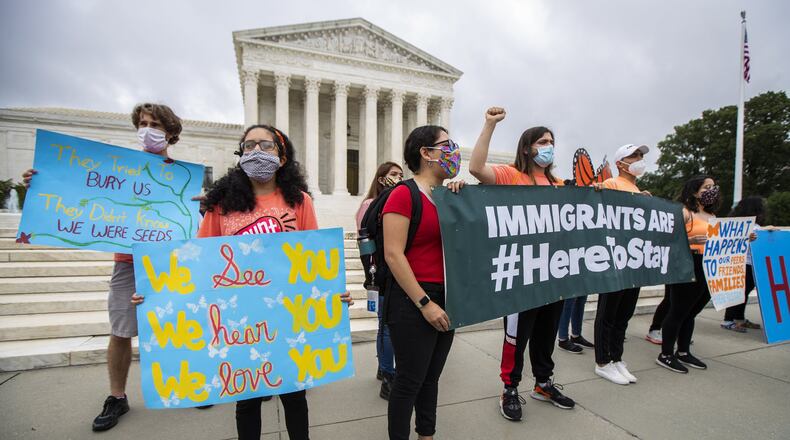The Supreme Court’s ruling on Thursday rejecting President Donald Trump’s effort to terminate legal protections for nearly 700,000 young immigrants prompted cheers from surprised Georgia Democrats, immigration and business groups.
Local Republicans who have backed the president’s hard line on immigration, meanwhile, decried the narrow 5-4 decision. Congressman Doug Collins of Gainesville, a U.S. Senate candidate and until recently the top Republican on the House Judiciary Committee, called the ruling a “power grab” and said the Supreme Court is “setting a dangerous precedent.”
The dispute is far from settled. The high court’s ruling is expected to only temporarily shield the Obama-era Deferred Action for Childhood Arrivals program, or DACA, since it left the door open for Trump to unwind the program if he is reelected in November.
“It’s time for America to seek a permanent solution to protect DREAMers, and make sure that pathways to citizenship are open and available across our country,” said Democratic Party of Georgia Chairwoman Nikema Williams, using a common term for young people brought to the U.S. illegally as children whom DACA seeks to protect from deportation.
Joining with the Supreme Court’s four liberal members, Chief Justice John Roberts wrote that Trump did not follow the proper process when he moved to kill DACA in September 2017.
“We do not decide whether DACA or its rescission are sound policies,“ Roberts wrote for the majority. “We address only whether the agency complied with the procedural requirement that it provide a reasoned explanation for its action. Here the agency failed to consider the conspicuous issues of whether to retain forbearance and what if anything to do about the hardship to DACA recipients.”
Because it will take months or longer for the regulatory process and legal challenges to play out, any major changes to the program aren’t expected until after the election.
While immigration is one of the more polarizing political issues in Washington, Americans are more broadly supportive of providing permanent legal status to Dreamers. In a recent poll from the Pew Research Center, 74% of respondents said they'd support such a law, including 54% of Republicans.
More than 21,000 Georgians participated in DACA as of last summer, according to the federal U.S. Citizenship and Immigration Services, and many have no memories of the country where they were born.
Read more: Battle over the fate of Dreamers flares in Georgia
Created in 2012, the program grants renewable two-year work permits and deportation deferrals to immigrants who were brought to the U.S. before they turned 16, who are attending school and who have no felony convictions.
One recipient is Raymond Partolan, a Sandy Springs paralegal who immigrated to the U.S. from the Philippines when he was 15 months old.
The 27-year-old said he was “elated” by Thursday’s decision but that more work needs to be done to convince Congress to provide a pathway to citizenship for Dreamers and other undocumented immigrants — and to prompt sympathetic Georgians to show their might at the voting booth this fall.
“The DACA program is and always was a temporary stopgap to protect people like me in the absence of permanent congressional action on this issue,” said Partolan, who grew up in Macon and is a Mercer University graduate.
Trump on Thursday wasted no time hitting back against the court for its ruling.
“These horrible & politically charged decisions coming out of the Supreme Court are shotgun blasts into the face of people that are proud to call themselves Republicans or Conservatives,” Trump tweeted. “We need more Justices or we will lose our 2nd Amendment & everything else. Vote Trump 2020!”
Cracking down on illegal immigration was a centerpiece of Trump’s 2016 presidential campaign and is expected to emerge as a key issue in his reelection battle.
Two years ago, the president floated a proposal that traded a path to citizenship for 1.8 million Dreamers in exchange for sharp new limits for legal immigration and billions for a border wall and security funding. Congressional Democrats swiftly rejected it. Counter-proposals were in turn dismissed by the GOP.
Thursday’s decision was welcomed by some of the state’s most influential business groups, including the Georgia Chamber. Chris Clark, the chamber’s president, said DACA “provides critical and essential workforce to our state and national economies every day.”
Still unclear is how Thursday's ruling could impact a pending piece of bipartisan legislation in the Georgia General Assembly. House Bill 997 would allow DACA recipients to receive in-state tuition rates at some Georgia colleges. It was shelved in March after an influential committee chairman, Alpharetta Republican Chuck Martin, said he wanted to wait for the Supreme Court to weigh in on DACA first.
The Associated Press and staff writer Jeremy Redmon contributed to this article.
About the Author
Keep Reading
The Latest
Featured


